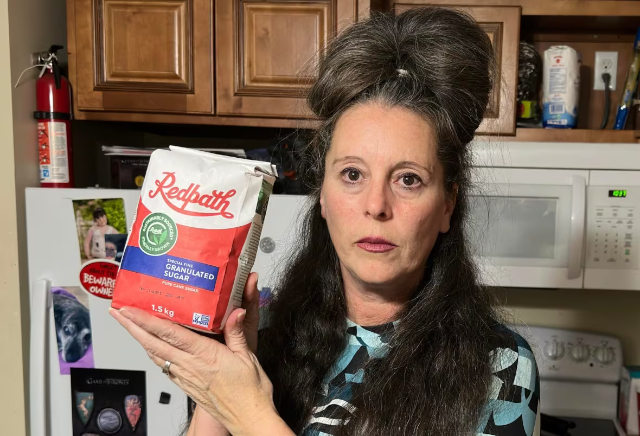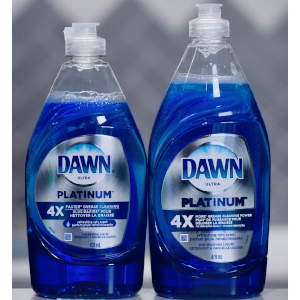Just read another scathing condemnation of wholesale shrinkflation. This one, specific to Canada. Consumers across the land have reported shrinkage of some products by as much as 25 percent in a single whack. While the price stayed the same…
 Janet Dermody: With a severely shrunken bag of sugar…
Janet Dermody: With a severely shrunken bag of sugar…
We’re pretty much used to shrinkflation, now-a-days. A little at a time. Adding up over time. But not as noticeable as some recent discoveries by Canadian consumers.
What they found
A CBC News report spotlighted several disgusting instances of wholesale ‘shrinkflation’. You’ll probably recognise the brands and product names…
Dish washing detergent
Mississauga resident Pepper Brooks saw the proof for herself when she prepared to wash a sinkful of dirty dishes. She had the end of one bottle of Dawn Platinum 4x detergent on the counter, right next to a new one she’d just bought.
But one bottle was significantly smaller, and contained 10 per4cent less product – at the same price. The deception aspect of shrinkflation comes in with the reduction in bottle size. The new, smaller bottle appeared to be just as full as the older, larger one.
Granulated Sugar
Janet Dermody of Sydney, Nova Scotia, describes herself as an ‘avid baker’. She uses a lot of sugar. Naturally she noticed the shocking change in her latest bag of the ordinary, white granulated stuff.
Rather than the usual 2 kg bag she was expecting, the new one came in at only 1.5 kg. A whopping reduction of 25 percent in volume. But the package design and price remained the same.
“It needs to be regulated and it needs to be regulated now,” Dermody told CBC. “Why did you take away half a kilo of sugar? […] I felt that was such a shady, sneaky thing for them to do.”
Absolutely. But it’s not illegal. And they hoped you wouldn’t notice. They think you’re either stupid or mindless.
Turns out this shrink was the retailer’s, Walmart’s, idea. The mega-chain has since announced it’s going back to the old 2 kg bags at the old price. And it quickly reduced the price of the smaller bags by 17 percent after the story surfaced. Damage control. Baaaaad Walmart! Bad!
Doritos
London area teen Katelyn Cornelius discovered that her fave brand of salty snack has shrunken from 80 g to 72 g in weight. The Doritos bag was the same size, and the price was the same. But she got less. She only confirmed the shrinkage when she got suspicious and checked the Nutrition Facts label. And discovered the Calorie count for the package was less than that on an old bag she had purchased earlier.
“It’s crazy that they — overnight — can just make that switch,” she said. “I would love to be informed about these decisions because then I can vote with my dollar if I still want to support that company or not.”
She says she’s going to buy chips less often.
A sense of betrayal
It comes down, I think, to a sense of betrayal among consumers. When a brand they’ve trusted tries to sneak something past them. Something that takes money out of their pockets.
That’s clearly the tone the ladies quoted above have taken. They’re also clearly frustrated. And that’s bad news for the manufacturers – and retailers – who are resorting to deception and ‘cheating’ to shore up their profits.
The only recourse consumers have, to fight shrinkflation, is to boycott shamelessly shrunken products. Or at least, as Cornelius says, buy less.
Are politicians next?
I also think the sense of betrayal and frustration consumers have for manufacturers and retailers will soon shift to politicians. If the politicos don’t take proper notice of the shrinkflaion crisis. And legislate an end to it.
Brazil has already legislated, and South Korea has a new law in the process of passage.
Or are our politicians afraid of aggravating the almighty supermarket industry, which literally controls the nation’s food supply?
The big picture
An annual report by the Ipsos Reid polling firm revealed some troubling statistics. The Global Inflation Monitor, a 33-country survey, tracks consumer perceptions of the cost-of-living crisis. And it turned up some troubling statistics about shrinkflation:
- Almost one in two (46 percent) say they have noticed products are getting smaller while the price remains the same.
- Forty-eight per cent say they think this practice is unacceptable…
- … While 22 percent feel it is acceptable.
“Brands must be careful around this issue, with many [consumers] thinking businesses making excessive profits is one of the biggest causes of the cost-of-living crisis.”
My take
Whatever happens, the shrinkflation crisis is coming to a head. As time passes, without regulations in place, manufacturers and retailers have just become bolder. Just a year or two ago, shrinkflation was relatively limited, to a few grams or a few percent of shrinkage at a whack. Now they’re indulging in reductions of 10 to 25 percent. It’s ridiculous.
My question to you is…
Are we mad as Hell, and not going to take it anymore?
Or are we just going to be ‘typically Canadian’ about it and march like sheep to the supermarket every week, to be fleeced?
And if we’re truly mad… Should we start demanding the government enact tough legislation against dastardly, cowardly, sneaky shrinkflation?
Muse on that…
~ Maggie J.

